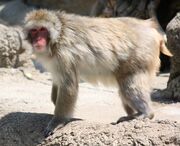Japanese macaques (Macaca fuscata) live farther north than any other non-human primate. Also known as snow

Snow monkey at the Cincinnati Zoo on Monkey Island.
monkeys, they have adapted to live through harsh, snowy winters. Thick fur, huddling together, and taking baths in natural hot springs keep them warm. As fruits and other food become scarce, they turn to tree buds and bark for survival.
Living in large troops, macaques learn and share information with each other, such as which foods are good to eat.Macaques often groom each other to strengthen their social bonds.Once they reach maturity, males will move from troop to troop, while females stay in the same troop their entire lives.
Facts[]
- Pronunciation: muh-KAK
- Height: 2 to 4 ft
- Weight: 15 to 30 lbs
- Lifespan: More than 30 yrs
- Habitat: Forest, mountains, and highlands
- Diet: Fruit, insects, leaves, crops and small animals
- Risk Status: Species at Risk (U.S. Endangered Species List—Threatened)